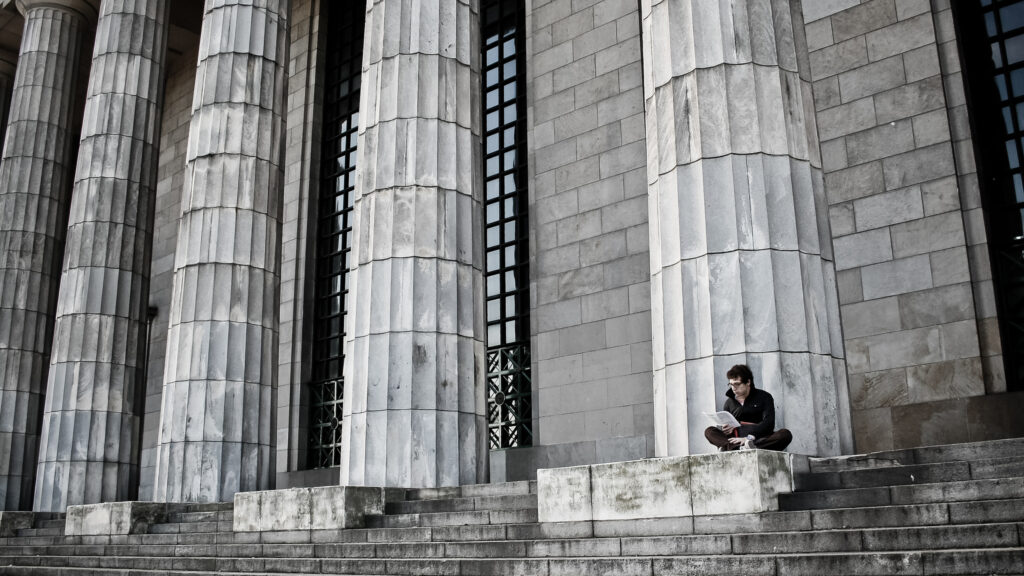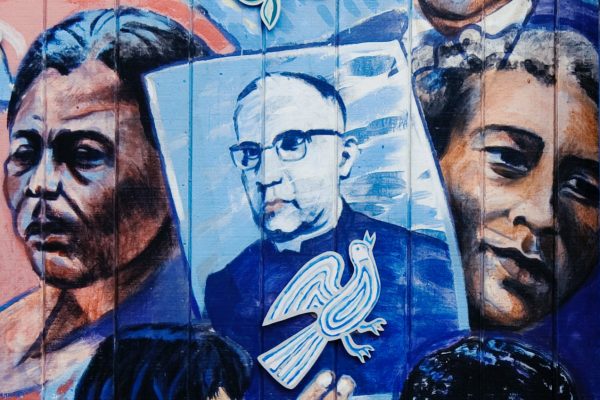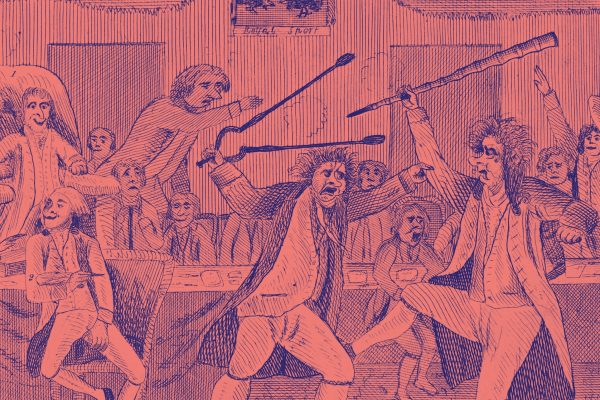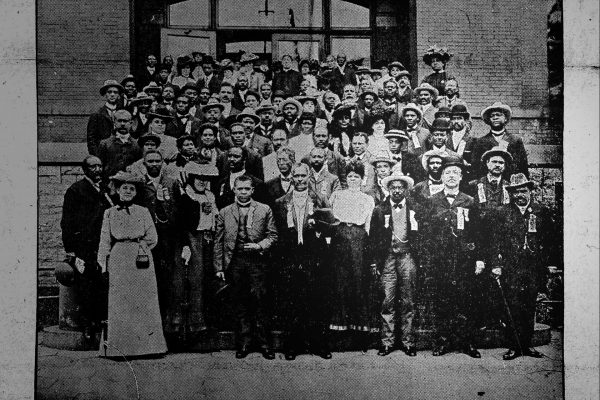Getting out of the cave and seeing things as they really are: that’s what philosophy is about, according to Almira Ribeiro. Ribeiro teaches the subject in a high school in Itapuã, a beautiful, poor, violent neighborhood on the periphery of Salvador, capital of the state of Bahia in Brazil’s northeast. She is the most philosophically passionate person I’ve ever met.
Most of the four million slaves shipped from Africa to Brazil were sold in Salvador, the first residence of Portugal’s colonial rulers. It’s still Brazil’s blackest city. In Ribeiro’s neighborhood, children play football or do capoeira, pray in Pentecostal Churches or worship African gods. Many are involved with drugs; “every year we lose students to crack,” she tells me. And they study philosophy two hours each week because of a 2008 law that mandates philosophy instruction in all Brazilian high schools. Nine million teenagers now take philosophy classes for three years.
“But seeing things as they really are isn’t enough,” Ribeiro insists. As in Plato’s parable in The Republic, the students must go back to the cave and apply what they’ve learned. Their lives give them rich opportunities for such application. The contrast between the new luxury hotels along the beach and Itapuã’s overcrowded streets gives rise to questions about equality and justice. Children kicking around a can introduce a discussion about democracy: football is one of the few truly democratic practices here; success depends on merit, not class privilege. Moving between philosophy and practice, the students can revise their views in light of what Plato, Hobbes, or Locke had to say about equality, justice, and democracy and discuss their own roles as political agents.
To foster that discussion, Ribeiro must take on a deeply rooted political defeatism. Voting in Brazil is obligatory, but many think it’s useless. In 2010, the largest number of votes for any member of congress went to Tiririca, a popular TV clown, who ran on the slogan, “I don’t know what a congressman does, but vote me in and I’ll tell you.” João Belmiro, another high school philosophy teacher, finds this outrageous. Philosophy, he hopes, will bring change before long.
“There are also other ways of political participation,” Ribeiro tells her students. She gives them the town hall’s phone number for complaints about infrastructure and asks them to find something in their street they want repaired. When one student calls, nothing happens. But when fifteen call, the city reacts. “You see that pothole?” she asks me. “It’s been closed. And that street lantern? It’s been fixed. Thanks to our philosophy class. . . . Politicians can’t afford disgruntled citizens who will vote them out of office.” In the same vein she’s now organizing an association of philosophy teachers. One urgent matter is the lack of qualified personnel. Another project is improving the relationship with the philosophy department at the Federal University of Bahia (UFBA), the region’s academic hub. Most teachers I meet complain that academic philosophers ignore them or look down on them.
That’s not surprising, considering that the 2008 law is above all a political project. In 1971 the military dictatorship that ruled Brazil from 1964 to 1985 eliminated philosophy from high schools. Teachers, professors in departments of education, and political activists championed its return, while most academic philosophers were either indifferent or suspicious. The dictatorship seems to have understood philosophy’s potential to create engaged citizens; it replaced philosophy with a course on Moral and Civic Education and one on Brazil’s Social and Political Organization (“to inculcate good manners and patriotic values and to justify the political order of the generals,” one UFBA colleague recalls from his high school days).
The official rationale for the 2008 law is that philosophy “is necessary for the exercise of citizenship.” The law—the world’s largest-scale attempt to bring philosophy into the public sphere—thus represents an experiment in democracy. Among teachers at least, many share Ribeiro’s hope that philosophy will provide a path to greater civic participation and equality. Can it do even more? Can it teach students to question and challenge the foundations of society itself?
• • •
I was intrigued when I first heard about the law and wanted to see for myself whether philosophy could do something outside of academia. My path to this subject is both intellectual and personal. I am an academic philosopher in Canada, with Brazilian roots: my parents were activists with a Marxist student group opposing the dictatorship and fled before my birth, though we returned to Brazil for four years after the 1979 amnesty for political refugees. With the help of colleagues and undergraduates from the UFBA philosophy department, I gained access to a broad range of schools in Salvador, where I was often welcomed as a guest teacher and had the opportunity to discuss with teachers their curricula, instructional styles, and hopes for the students.
A 2008 law requires Brazilian teenagers to study philosophy because it is ‘necessary for the exercise of citizenship.’
In every classroom I was at first flooded with questions: Who is this professor from Montreal and what’s he doing here? the students wondered. I quickly learned that my excitement about Brazil’s experiment with philosophy is not universally shared. “Learning how to read and write and basic mathematics is useful,” one student said. “But why should I care about Plato’s concept of the soul?”
I conceded to the class that learning philosophy for the sake of erudition may not be the best use of their time.
“But if you want to build a just and democratic society, isn’t it useful to get as clear as possible on what you mean by justice and democracy and to examine if you have good reasons to pursue these?” I asked. “And aren’t your intuitions about knowledge, goodness and beauty worth investigating?”
Well, perhaps. But first the students had more questions for me. Is it true that Canadian bacon is the best in the world? What do people abroad think about Brazil? How did I get into philosophy? And—still more personally—do I believe in God, a question I encountered almost every time. I tried to get out of it by mentioning Spinoza’s impersonal God. That didn’t mean much to the students and, truth be told, I don’t even believe in the God of Spinoza. “We knew it—all philosophers are atheists!” they would say. When I asked who was a Catholic, who was an evangelical, and who practiced the Afro-Brazilian religion Candomblé (Salvador alone has more than 2000 terreiros, Candomblé’s houses of worship), all students raised their hand at least once.
I assured the students that until the nineteenth century hardly any philosopher was an atheist. Plato’s Euthyphro—with its argument about the relationship between ethics and the will of the gods—gets us into a lively discussion.
I asked them, “Do moral norms depend on God’s will? Would it be fine to murder an innocent child if God says so?” The students found the idea outrageous.
“But doesn’t God order Abraham to sacrifice Isaac?” I asked. There was a moment of confusion.
“But Abraham also holds God responsible when he wants to destroy Sodom and Gomorra,” one student replied. That can be interpreted as an independent norm of justice, I admitted.
I pressed on. “But if God must submit to objective moral norms, do we still need the Bible for moral guidance?”
Another student doubted that reason can replace the Bible: “Reason even justifies killing an innocent child if that’s the only way to save a thousand lives.”
We assumed for the moment that reason is indeed unable to ground absolute moral norms. “But how can we act on the authority of the Bible if there are so many different interpretations of it?” I asked. A third student intervened: “Can’t each interpretation be right in its own time and place?” I reminded them of Salvador’s Museum of Modern Art, which they visited on a class excursion. It is located in a beautifully restored casa grande—a colonial plantation owner’s mansion—with adjacent slave dormitories—senzala. “You remember the private chapel? Going to mass and having slaves obviously wasn’t a contradiction back then.” Most students have slaves among their ancestors. So they were reluctant to concede that an interpretation of the Bible allowing slavery is valid. “Is, then, reason the arbiter between competing interpretations?” I asked.
We hadn’t reached a conclusion when the bell rang, but we’d touched on a wide range of important issues in an open-ended Socratic discussion that seemed well suited to the public philosophy envisioned in the 2008 law. By giving students the basic semantic and logical tools they need to clarify their intuitions and to analyze arguments for and against their views, philosophy could help to extend and refine the debate that naturally arises in a pluralistic society from conflicting interests, values, and worldviews. And it could also help citizens make wise use of the power they have in a democracy, as Ribeiro’s town hall exercise shows.
But can philosophy really become part of ordinary life? Wasn’t Socrates executed for trying? Athenians didn’t thank him for guiding them to the examined life, but instead accused him of spreading moral corruption and atheism. Plato concurs: Socrates failed because most citizens just aren’t philosophers in his view. To make them question the beliefs and customs they were brought up in isn’t useful because they can’t replace them with examined ones. So Socrates ended up pushing them into nihilism. To build politics on a foundation of philosophy, Plato concludes, doesn’t mean turning all citizens into philosophers, but putting true philosophers in charge of the city—like parents in charge of children. I wonder, though, why Plato didn’t consider the alternative: If citizens had been trained in dialectic debate from early on—say, starting in high school—might they have reacted differently to Socrates? Perhaps the Brazilian experiment will tell.
• • •
The Socratic approach does not, however, have much support among the two main camps competing to define the high school curriculum in Brazil: academic philosophers on the one hand and political activists and educators on the other.
For academic philosophers, philosophy is not a democratic practice or an emancipatory exercise, but a rigorous scholarly discipline. According to the narrative I hear time and again, philosophy started in Brazil in the 1930s, when French scholars founded the philosophy department at the University of São Paulo. They put an end to the “dilettante period” characterized by the oratory of lawyers and the scholasticism of priests that had dominated Brazilian philosophy until then. Among the French scholars were Martial Guéroult and Victor Goldschmidt, who taught that doing philosophy is no longer possible, only history of philosophy: reconstructing systems of thought through a painstaking analysis of their immanent structure. Since then, studying the history of Western philosophy has been the paradigm of serious philosophy in Brazil.
‘Teaching philosophy to students who can hardly read and write,’ Giannotti said, ‘is sad foolishness.’
For political activists and educators, this leads to “intellectual schizophrenia” as Eduardo Oliveira, who teaches in UFBA’s Faculty of Education, puts it. “If we want to think we must put on a German, French, or British head; the Brazilian head won’t do,” he says. Many in this camp are affiliated with the “philosophy of liberation” movement, a series of loosely related intellectual exercises resisting local dictatorships and what is seen as the West’s political, economic, and cultural domination. This movement draws on many sources, from Marx to Levinas. It emerged in South America in the 1960s and ’70s together with the pedagogy and the theology of liberation. But whatever its merits, I wonder if any substantive philosophical agenda is compatible with the diverse views citizens hold in a democracy.
Among the greatest skeptics of the 2008 law is José Arthur Giannotti, one of Brazil’s most respected academic philosophers. He is a close friend of former president Fernando Henrique Cardoso, who vetoed the law when it was first proposed in 2001, after it had already been approved by the legislature. “Teaching philosophy to students who can hardly read and write,” Giannotti said in 2008, “is sad foolishness.”
To be sure, conditions are dire in public schools. Overworked and underpaid teachers deal with students who are often in class for the free lunch, reduced bus fare, or because of former President Luiz Inácio Lula da Silva’s welfare program, the bolsa familia (family fund). More than 12 million poor families get tiny financial incentives to keep their children in school. Brazil still has 15 million illiterate people and an additional 30 million “functionally” illiterate who can decipher a text, but not understand it, much less write something coherent.
When I mentioned Giannotti’s statement to students they were outraged. They thought he described a vicious circle: if you can’t establish a just society democratically without the citizens knowing what justice is, and if you can’t know what justice is without philosophy, it would be impossible to achieve justice in an unjust society like Brazil if studying philosophy presupposes justice.
The philosophy law presented academic philosophers with a fait accompli, so they have been mostly vocal in ensuring that the high school curriculum reflects their idea of rigor. The Curricular Guidelines—published by the Ministry of Education in 2006, as the law was heading for final approval—reflect a broad consensus: high schools should adopt a toned-down version of the academic program with history of philosophy as its “cornerstone.”
When I asked Ribeiro what she thought about these guidelines, she looked amused. “Let’s see what my evening class students”—maids, taxi drivers, construction workers, and others who hope the high school diploma will get them out of what she calls “slave work”—“will say if I ask them to make a structural analysis of Kant’s Critique of Pure Reason.” And even if it were possible, she didn’t see the point. “If the students can’t relate what they learn to their own experience—of what use will it be to them?”
But other teachers feel that they must follow the guidelines if they are to be taken seriously. “That’s what distinguishes a teacher with a philosophy degree from a charlatan who organizes superficial debates on this or that question of the day,” one teacher told me.
One UFBA student pointed out, though, “Nobody really thinks that high school students can get through Kant’s Critique of Pure Reason. This helps to explain the ubiquitous use of didactic manuals.” The idea seems to be that if you can’t read Kant, the next-best choice is to read a Kant digest by a recognized authority. After a précis of the history of Western philosophy, these manuals usually summarize what the author takes to be the principal areas of philosophy. In the most popular manual I saw, each chapter is followed by questions for the students. The teacher’s version includes an appendix with the correct answers. In the worst case this will lead to rote learning—one teacher goes so far as to give students multiple-choice assessments which include the question whether Sartre’s nationality is German, Swedish, French, or Russian. But that approach fits the general teaching culture in Brazil. Another UFBA student explained, “Since the goal is to get students into university, teachers must put everything into their heads on which they will be tested in the vestibular, the entrance exam.”
There are plenty of real-life experiences, though, that could be addressed in a philosophy class. Consider the myth of racial equality in Brazil, the idea that Brazil is a “racial democracy.” Following the Socratic call to self-knowledge, João Belmiro asks his students to sketch their biography and family background. “They always know much more about the white part of their family than about the black part,” he observed. One white colleague told me that his black wife doesn’t like to go with him to the beach. “People think she’s a prostitute going out with a gringo.” Another white colleague can’t bring his black wife to his parents’ house. “They’re poor and uneducated; she has a master’s in history and directs an archive of rare manuscripts from the colonial period.” In a country where races are so thoroughly mixed, what does it mean that skin color remains important?
‘Most of my students think that inequality is a law of nature,’ one philosophy teacher explained.
Or consider the gap between rich and poor in Brazil, one of the world’s widest. Many here don’t perceive it as unjust. In an elite private school in Salvador, philosophy teacher Luis Rusmando told me, “You’ve come to the most expensive and bourgeois school in town.” An Argentinian Marxist who once wanted to be a guerrilla combatant (two relatives, he told me, were killed by Argentina’s military dictatorship) and joined the fight for agricultural land redistribution when he first got to Brazil, he doesn’t quite know how he ended up at this school. Although about 80 percent of Salvador’s population are Afro-descendants, the only black people I saw in Rusmando’s school are cleaners and kitchen personnel. “Most of my students think that inequality is a law of nature,” he explained. That’s why they find nothing wrong with the social hierarchy that Plato proposes in The Republic. “Only when I tell them that wisdom, not money, rules, according to Plato, they’re confused.” Rusmando is also in charge of the students’ voluntary community service program. Every few months he drives out to a farm owned by one student’s family. “It’s amazing how naturally a sixteen-year-old takes charge of the twenty servants who work there,” he told me. The students bring donations to a local daycare and spend a few hours with the poor kids. “For most of them it’s an opportunity to party.” But he also notices the students who haven’t yet lost the ability to be surprised, and to question their narrow world of privilege. “Perhaps that’s why I paradoxically feel close to my students,” he said.
• • •
João Belmiro’s students have discussed justice. In 1888 Brazil was the last country in the Americas to abolish slavery. “But what is freedom worth,” one student asked, “without access to land, jobs, and education?” All students in his class are in favor of affirmative action programs in universities. The deterioration of the public school system in recent decades, which Lula’s center-left government did little to reverse, has made it all but impossible for poor children to get into one of the coveted public university programs—mainly engineering, law, and medicine—that open the door to wealth and prestige.
“But are quotas enough?” I asked the students. “Isn’t there a risk of graduating black engineers, lawyers, and doctors who think and behave exactly like their white colleagues?” If philosophy is indeed the way to change such attitudes, as the students proposed, what should it aim at? It turns out to be quite difficult to say how much equality social justice requires.
“Consider two acarajé stands,” I said, referring to Salvador’s most popular street food. One is run by a talented cook, the other by a cook without talent. Both work hard, but the first stand has lots of customers, the second only a few. “Would it be just to take part of the talented cook’s income and give it to the untalented one?” Differences due to talent or effort seemed acceptable to the students as long as equal opportunities were granted. I pressed harder: “Isn’t talent an arbitrary fact of nature? Why, then, should it be rewarded? And is effort really more in our control? If one cook has just lost a child in an accident and now is depressed and can’t work properly—does she deserve to be punished?” The bell rang. One more inconclusive discussion, and another invitation to continue the philosophical conversation.








